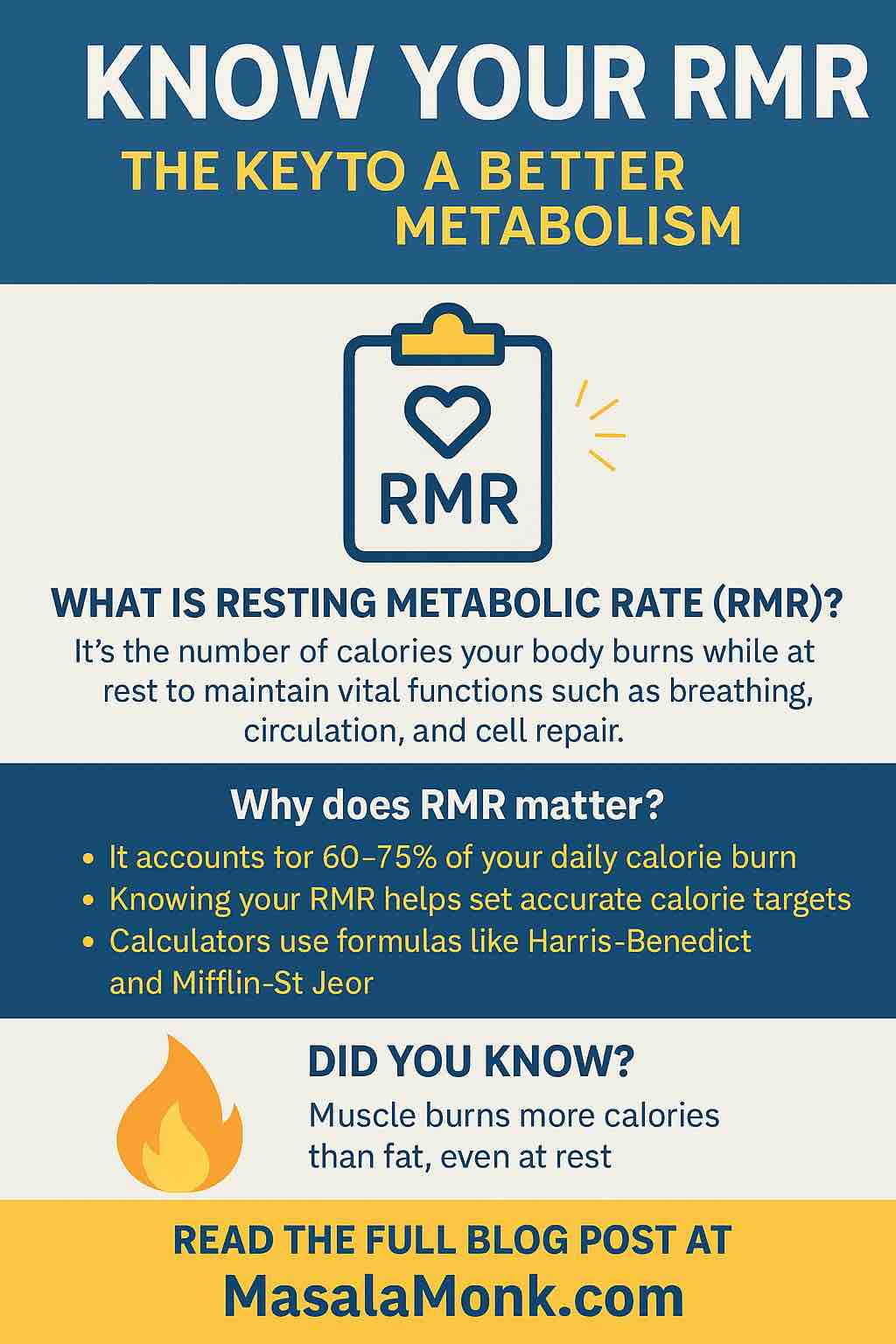
RMR Calculator
Welcome to our Resting Metabolic Rate (RMR) Calculator! Your RMR is an estimate of the number of calories your body needs to maintain basic physiological functions while at rest.
Let’s get started by inputting your details:
Gender:
🔥 Discover Your RMR: The Key to Unlocking Better Metabolism, Fat Loss & Fitness Goals
Have you ever wondered how many calories your body burns while simply resting? That number, known as your Resting Metabolic Rate (RMR), is one of the most crucial figures in your health journey—whether you’re trying to lose weight, build muscle, or simply maintain a healthy lifestyle.
Yet, despite its importance, most people are still guessing when it comes to understanding their calorie needs. That’s where an RMR calculator steps in—not just as a tool but as your personalized roadmap to smarter nutrition and effective workouts.
In this blog post, let’s dive into what RMR is, why it matters, and how our advanced RMR calculator (powered by science-backed formulas) can help you take control of your health goals.
🧠 What is RMR and Why Should You Care?
Your Resting Metabolic Rate (RMR) is the number of calories your body needs to maintain vital functions when you’re not physically active—things like breathing, circulating blood, brain function, and cellular repair.
This is not the same as the number of calories burned during exercise. In fact, RMR accounts for 60–75% of the total calories you burn daily. That’s a big chunk, which is why understanding it is key for setting accurate calorie targets—whether you’re eating to lose fat, gain muscle, or maintain weight.
🧪 How is RMR Calculated?
There are several scientifically validated formulas to estimate your RMR. Here are the most common ones used by experts and nutritionists:
- Harris-Benedict Equation
One of the earliest methods, it takes into account age, sex, weight, and height. While slightly older, it’s still widely used. - Mifflin-St Jeor Equation
Considered one of the most accurate for modern populations, this formula adjusts for age, weight, height, and gender with more up-to-date data. - Katch-McArdle Equation
This method is great if you know your body fat percentage because it estimates RMR based on your lean body mass (muscle mass).
Each of these equations gives you a slightly different number, but together they paint a comprehensive picture of your metabolic rate.
🚀 Why Our RMR Calculator is Smarter Than Most
Unlike most generic calculators, our tool gives you a detailed breakdown using all three major equations, helping you compare and understand which estimate might be most relevant for your body type and fitness level.
It factors in:
- Age
- Weight (in kg)
- Height (in cm)
- Gender
- An assumed body fat percentage for advanced insights
This makes it not only accurate, but also incredibly practical for goal-setting. No more guessing how many calories you should be eating!
🧮 What Can You Do With Your RMR?
Once you know your RMR, you can calculate your Total Daily Energy Expenditure (TDEE)—this is your RMR plus the calories you burn through movement and exercise.
Depending on your goals:
- 💪 To lose fat: Consume slightly less than your TDEE
- 🍽️ To maintain weight: Eat at your TDEE
- 🏋️ To gain muscle: Eat slightly above your TDEE
By knowing your baseline RMR, you’re no longer navigating your health in the dark—you’re using numbers to make smarter choices.
🏃♂️ Want to Burn More Calories at Rest?
Here’s the good news: You can increase your RMR over time! Here’s how:
- Build muscle: Muscle burns more calories than fat, even at rest.
- Eat enough protein: Digesting protein uses more energy (thermic effect of food).
- Stay active: Even light activity increases your overall energy burn.
- Avoid extreme dieting: Severe calorie restriction can slow your metabolism.
- Get enough sleep: Poor sleep negatively impacts hormonal health and RMR.
Knowing your RMR is just the start—optimizing it is the real win.
🔍 Why Everyone Should Know Their RMR (Yes, Everyone)
Whether you’re an athlete, a busy parent, or just starting your health journey, understanding your RMR helps you:
- Avoid under-eating or over-eating
- Design more effective diet plans
- Track progress with greater precision
- Adjust calories as your body changes
Most importantly, it gives you a sense of control and clarity.
🎓 Pro Tips to Use Your RMR for Weight Loss or Muscle Gain
For Weight Loss
👉 Subtract 300–500 calories from your RMR to create a sustainable calorie deficit.
For Muscle Gain
👉 Add 250–500 calories above your RMR to fuel muscle building and recovery.
For Maintenance
👉 Match your total intake (RMR + activity level) to stay steady and strong.
📊 It’s Time to Stop Guessing — Know Your Numbers
Imagine being able to say:
“I burn exactly X calories per day doing nothing—and I now know how to adjust my diet based on facts, not fads.”
That’s the power of using our RMR calculator. It’s easy to use, visually intuitive, and gives you results within seconds.
Thousands are already using it to transform their approach to nutrition, fitness, and fat loss. Don’t be left behind.
Ready to Take Charge of Your Metabolism?
Your RMR is the starting point of your personalized health blueprint. Whether your goal is to lose 5 kilos, build a leaner body, or simply understand your metabolism better—knowing your RMR is non-negotiable.
🔥 Input your details. Get your RMR in seconds. Make informed health decisions from today.
🧠 Knowledge is power—but applied knowledge is transformation.










[…] your estimate in the Army Body Fat Standards & Calculator, set a realistic target using the RMR Calculator, and plan day-to-day food with Macro Master—so everything you need lives on […]
[…] “dirty bulks,” but you do need consistent surplus. Start by estimating maintenance with the RMR calculator, then set macros using Macro Master and adjust from the scale each […]